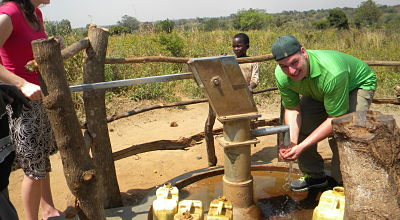NFL Star Helps Bring Clean Water to Uganda
As a right guard for the Indianapolis Colts, Seth Olsen uses his 6-foot, 4-inch, 305-pound frame to block his opponent’s moves.
But while his physical strength, size and stamina make a difference on the football field, when it comes to making a difference in the world, Olsen makes charitable contributions to Lifewater International, a nonprofit, Christian organization that dispatches trained volunteers to visit in-country partners implementing water, sanitation and hygiene improvement projects in some of the poorest countries in the world.
Olsen, in fact, just got back from a 10-day trip to Alyet Village in northern Uganda, where he got to see firsthand how his donations have been enabling Lifewater staff and volunteers to make a positive difference in the lives of thousands of Ugandans.
“It was an amazing experience,” says Olsen, 26, who started supporting Lifewater’s efforts two years ago when he was playing for the Denver Broncos. “I witnessed a well drilling and a hand pump installation. The women in the village were dancing and singing. It was amazing to see the smiles on their faces and see how happy they were that they no longer had to drink water out of their old water source.”
The people of Alyet Village previously had to walk close to five kilometers (about three miles) to get water, which they carried in containers on top of their heads. But the water was contaminated and spread a variety of diseases through the community, including diarrhea, hepatitis, typhoid and yellow fever.
According to UNICEF and the World Health Organization, diarrhea alone kills more young children than AIDS, malaria and measles combined.
But by training their local partner to dig a new well just outside their community, Lifewater has provided the people of Alyet Village sustainable access to safe water that will not only improve their health, but reduce their exposure to rapes, assaults and kidnappings—since women and children will no longer have to walk long distances alone to fetch water. Having water close by also increases the ability to Alyet Village children to attend school, since they no longer have to spend entire days walking long distances to obtain the water they need.
“Just surviving and existing in the extreme poverty I witnessed takes up their entire days,” Olsen said. “But now they have the peace of mind of knowing their water is not only close by, but safe.”
But as Olsen learned, Lifewater is committed to sustainable community transformation through partnerships. The group trains in-country partners, in this case, a group called Divine Waters Uganda, in well drilling as well as proper sanitation and hygiene practices. In turn, Divine Waters provides the people of Alyet Village with education in sanitation and hygiene so that they can learn how to keep themselves and their water source free of water-borne diseases on an ongoing basis.
Learning proper techniques for hand washing, cooking, bathing and safe water transport are critical elements of this training, which Divine Waters Uganda is now providing to Alyet Village residents on an ongoing basis.
And now that the people of Alyet Village have water close by, they will have an easier time getting safe water not just for drinking, but to keep themselves, their dishes and their water containers clean.
“We want our efforts to be self-sustaining. So instead of just offering aid, such as going in and digging a well, we train local groups like Divine Waters Uganda to do the work that we do using the resources they have,” said Joe Harbison, Lifewater’s CEO.
By June of this year, Harbison added, Lifewater and Divine Waters Uganda will have completed a three-year project in which they developed safe water supplies for more than 66,000 Ugandans in nearly 200 villages.
Divine Waters Uganda is also helping Lifewater spread the word about Christianity and the Gospels’ message of love and helping one another.
“We try to take a holistic approach,” Harbison said. “We incorporate the love of God in our training and we try to restore their hope by telling them that God loves them, that they are worth clean water, that they are worth the dignity of having a latrine.’ And we tell them that our efforts are a reflection of God’s love.”
So far, Lifewater’s approach is paying off, not only in Uganda, but around the world. Since Lifewater’s founding in 1977, the group, along with trained volunteers and in-country partners, have helped improve water, sanitation and hygiene for more than 2 million people in more than 40 countries, while also sharing hope in the gospel with some of the poorest regions in the world. In addition to Uganda, Lifewater is currently working on water, sanitation and hygiene projects in Cambodia, Laos, Tanzania, Ethiopia and Kenya.
Olsen, for his part, is hoping to spread the word about Lifewater’s efforts in the hopes that others will join him in supporting the San Luis Obispo, Calif.-based organization as it works to bring safe water, sanitation, hygiene and hope to some of the poorest people in the Third World.












